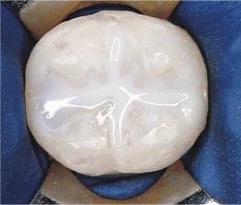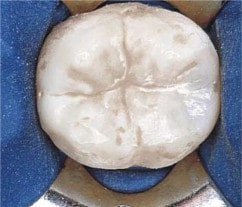Sealants are another line of defense against cavities, in addition to brushing and flossing. Our molar teeth have tiny grooves and pits on the chewing surface, that are so small they can’t even be cleaned with a toothbrush bristle. These small grooves are the perfect place for bacteria to hide and gather for a cavity to begin.
We use sealants to cover these small grooves and prevent the bacteria from infiltrating. When applied correctly sealants can prevent 80% of cavities for up to 2 years and continue to prevent 50% of cavities for up to 4 years. Sealants are usually indicated in childhood, first when the six-year molars erupt and then when the 12-year molars erupt. Sealing these permanent molars soon after they come in can help ensure they stay cavity-free for a longer period. Getting sealants is a painless and quick process that does not require an anesthetic.
The process for sealants is as follows:
- Etch teeth, this cleans and roughens the tooth surface to prepare for a sealant.
- Rinse & dry teeth thoroughly
- Apply sealant material and spread evenly through pits and grooves
- Cure (harden) with a UV light for 30 seconds
- Done! That’s it, quick and pain free!
Many insurance companies will usually cover sealants up to a certain age limit. We can help you determine if you or your child has sealant coverage. Sealants will typically last for several years before they may need to be reapplied. Even if you are past the age limit for coverage, you may want to consider paying out of pocket to have them reapplied. As they say, an ounce of prevention is worth a pound of cure! Paying for sealants, even out of pocket, is much cheaper than the cost of having a filling because a cavity got in those grooves and destroyed the tooth structure
At your regular dental visits, your dentist will evaluate if sealants are recommended for you! As always, let us know if you have any questions regarding the sealants or if your insurance covers them.
References
Mouth Healthy by ADA
https://www.mouthhealthy.org/en/az-topics/s/sealants
CDC
https://www.cdc.gov/oralhealth/dental_sealant_program/sealants-FAQ.htm


